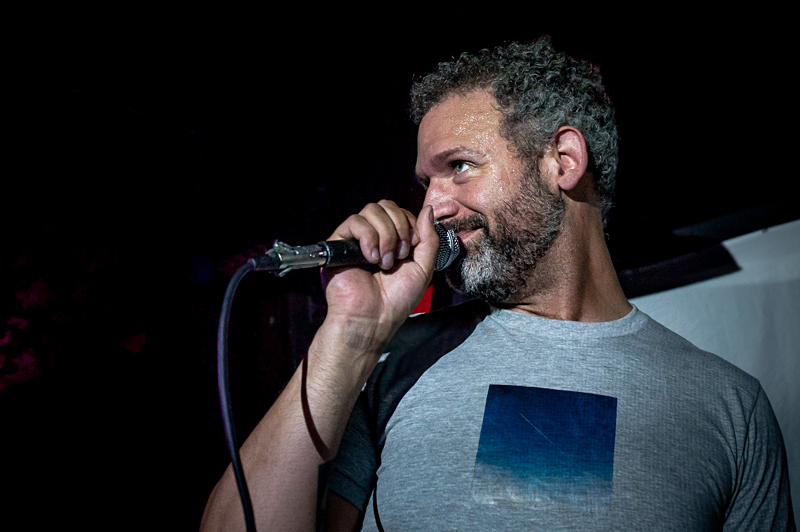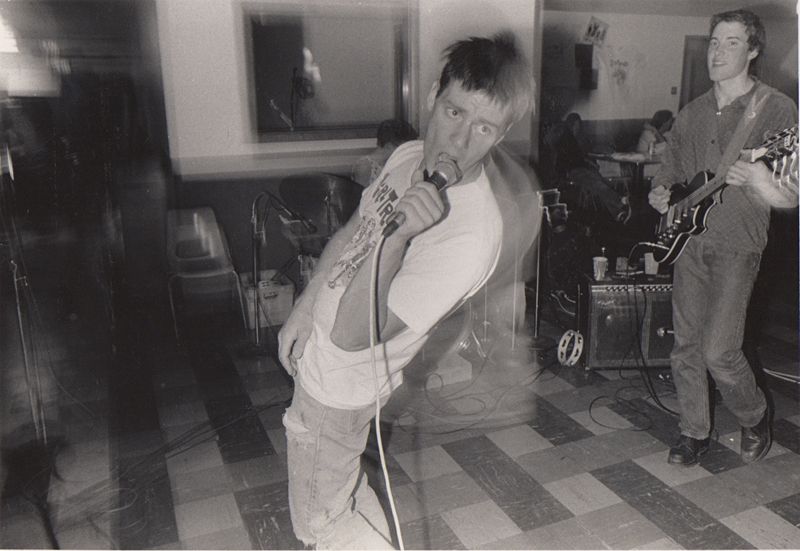Like the fictional character Chauncey Gardiner from Being There, Erik Blood likes to watch. Or to be more specific, Blood likes to “observe.” That’s true both of his acclaimed work as one of Seattle’s hottest record producers — with Shabazz Palaces, the Moondoggies, and THEESatisfaction — but also true of his new album, Touch Screens, which concerns itself with, of all things, pornography.
Blood says he didn’t decide to make a concept album about porn to create controversy, he just saw the theme as one that was overdue for closer musical examination. “The album is my observations,” he says. “Some of the songs are love letters to certain directors, but some are just kind of a fictional dialogue with characters or performers. I don’t really have anything to say about pornography as a thing; the album is simply my observations. And porn itself caters to observers.”
“Today’s Lover,” which KEXP has been playing, addresses the accessibility of porn. Other songs take the viewpoint of performer, or watcher. A few, like “Shame Spots,” address, well, more practical aspects of the genre.
But if there is a larger theme to the album, it is that Blood misses the era when there was an art to smut. ” ‘The Lonesome Death of Henry Paris’ is my mini-bio about Radley Metzger, who went by the name Henry Paris when he made hard-core films,” Blood says. “For four of five years he made these really amazing porno films; then he disappeared. It’s fascinating to me that he took making pornography so seriously, and made it so pretty, and so interesting to actually watch.”
Blood is 35. He’s been making music for two decades, and has produced several dozen bands over the years. His debut album as an artist was 2009’s The Way We Live, which newgay.net called “a combination of Bob Mould and My Bloody Valentine.”
His first production gig was with Mountain Con’s 1999 EP, The Highpoint Project. The relationship was so successful that for a time he joined the band. He later joined (and produced) the Turn-Ons, where he got his first taste of the porn racket when the band opened for porn legend Ron “Hedgehog” Jeremy at the Off Ramp. “It turned into the ultimate nightmare gig,” Blood recalls. “The audience hated us and called us all faggots. And Ron was awful. It was a nasty mess, but at least makes a funny story.”
It was Blood’s first work with Shabazz Palaces in 2009 that brought him what has been his highest-profile gig. He worked with Shabazz on two EPs that year, and followed up with 2011’s Black Up. The widely inventive LP earned Blood national exposure, but it also taught him much about how to be patient behind the board. “That album taught me everything doesn’t need to be perfect,” he says. “Inventiveness is more important than perfection.”
Shabazz returns the love: “Blood is a sonic sorcerer sent by the song sirens to sentinel solid sounds,” Ishmael Butler says. “He’s a soulful slayer of the superfluous while simultaneously savoring the non-sequitur. Like a sinusoid, he smoothly satiates signal summoning sinister from the sweet and seeing to it surely we stay sucker-free.”
Blood says it is always the experience of hearing music created the first time that draws him in: a magical moment of creation in the studio. He’s just finished producing six tracks for post-rock act Stephanie—”my favorite band in the city”—and has recently mixed an album for local hip-hop concern Champagne Champagne, a band he hopes to produce one day.
Bands that have worked with Blood paint him as a huge music lover who will attend all of their live shows and spend countless hours in pre-production before starting a project.
“We had talked for six months before going in to work with him, and he came out to almost every show we played to get a good idea for how the record should sound,” says Bryce Brown of the local electronic band Crypts, whose Blood-produced record is being released by Sargent House Records in September. “He’s got a truly artistic mind, and was completely willing to try out different weird ideas.”
And though that kind of reputation has earned him numerous opportunities, he still has a day job. He works as a legal messenger during the day, and has for the past 11 years. “I gotta pay the rent,” he jokes. “I don’t want to be homeless.”
While the ’70s pornography Blood pines for often sported cheesy music, the sound of Touch Screens is surprisingly sophisticated, and best can be described as edgy alternative rock, though without much verse/chorus/verse. The singing is secondary for Blood, who describes vocals as simply “another instrument,” and one that he wants to manipulate in his production. “I like vowel sounds,” he says. “Usually words just fall into place, and in this situation I steered words towards certain subjects because I could.”
Blood says he’s realistic about the commercial prospects of any music outside the mainstream today, but he remains iconoclastic about only working with bands he loves. And he’s also clear about what formats Touch Screens was released in: “The album is only coming out on limited-edition vinyl, and digital release. There will be no CDs.”
And though a casual listener might miss the theme behind his new album, even before it was released Touch Screens was not without sexual controversy on at least one digital music platform. The album cover, though not the music, was initially banned by iTunes. “They thought the cover was too explicit,” Blood explains.
Blood had Dumb Eyes, the firm that designed the cover, create special art just for iTunes. But he considered one other option that itself might have been considered another ode to a lost time when smut was more strictly controlled, and sometimes delivered in the mail in plain brown wrappers. “I thought,” Blood laughs, “about sending them another cover with just a giant black box on the front.”








